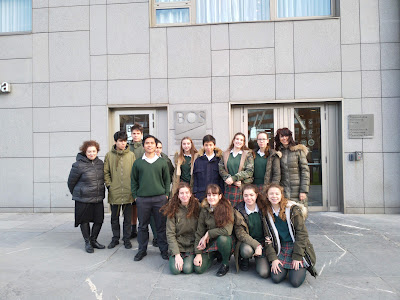Como estamos dentro del PROGRAMA DIDÁCTICO de ABAO Bilbao Opera, el pasado Martes 7 de Diciembre, tuvimos una charla didáctica de la mano de Amaia Otazua que de manera coloquial y amena, introdujo a los alumnos en el mundo del montaje de una ópera.
Se hizo un repaso de los principales aspectos de las producciones (vestuario, atrezzo, equipos técnicos…), de las personas y elementos que el público puede ver sobre el escenario, así como de aquellos que no se ven y que los espectadores suelen desconocer.
La charla contó con apoyo audiovisual para que los alumnos visualizaran los preparativos y el resultado final a través de fragmentos de ópera conocidos.
El Martes día 14 de Enero los alumn@s de Tercero y Cuarto de ESO, hemos ido al Palacio Euskalduna a visitar el backstage:
Visitas guiadas al Backstage:
Ha sido muy interesante ver lo que supone crear un espectáculo tan completo donde el trabajo cooperativo es vital para un buen resultado. L@s alumn@s han podido contextualizar los contenidos tratados en la charla vinculándolos al espacio físico del teatro: la sastrería, los camerinos, las salas de ensayo y el escenario.
En las fotos podéis ver parte de lo que hemos visto allí.















